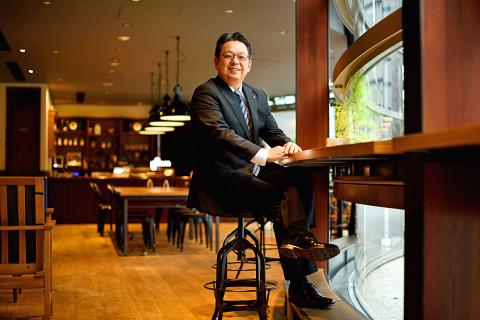Japan Tobacco Inc favors pursuing deals in Southeast Asia and markets where it lacks a presence as it actively seeks to expand overseas, the company’s new CEO said.
The world’s third-largest listed tobacco company is aiming to command about 40 percent of the heated tobacco market in Japan by 2020, Masamichi Terabatake said in an interview yesterday at the company’s headquarters in Tokyo.
A pillar of that growth would be its next-generation device, Ploom Tech, as well as other new devices the company has in development.

Photo: Bloomberg
“We look at economics, population growth and gross margin expansion in markets we want to enter,” said 52-year-old Terabatake, who took the helm at Japan Tobacco this month. “Recently, one such area is Asia.”
The maker of Mevius and Winston cigarettes is targeting acquisitions overseas and expanding its offering of high-tech smoking devices to grow profits as the conventional cigarette market is pressured around the globe.
Japan Tobacco has been slower than its global competitors, such as Philip Morris International Inc and British American Tobacco PLC, in selling next-generation products, which heat tobacco to deliver nicotine.
Underdeveloped markets are more attractive compared with a complicated acquisition, Terabatake said.
Earlier this year, analysts speculated that Japan Tobacco might buy Imperial Brands PLC.
However, the firm has focused on developing nations, such as Indonesia, the Philippines and Ethiopia, where it has spent more than a combined US$2 billion over the past few months acquiring assets.
Terabatake declined to comment on an Imperial acquisition directly.
The tobacco industry has been consolidating as smoking rates decline. After large deals like British American Tobacco’s US$49 billion buyout of Reynolds American Inc, there are few big targets left.

With an approval rating of just two percent, Peruvian President Dina Boluarte might be the world’s most unpopular leader, according to pollsters. Protests greeted her rise to power 29 months ago, and have marked her entire term — joined by assorted scandals, investigations, controversies and a surge in gang violence. The 63-year-old is the target of a dozen probes, including for her alleged failure to declare gifts of luxury jewels and watches, a scandal inevitably dubbed “Rolexgate.” She is also under the microscope for a two-week undeclared absence for nose surgery — which she insists was medical, not cosmetic — and is

CAUTIOUS RECOVERY: While the manufacturing sector returned to growth amid the US-China trade truce, firms remain wary as uncertainty clouds the outlook, the CIER said The local manufacturing sector returned to expansion last month, as the official purchasing managers’ index (PMI) rose 2.1 points to 51.0, driven by a temporary easing in US-China trade tensions, the Chung-Hua Institution for Economic Research (CIER, 中華經濟研究院) said yesterday. The PMI gauges the health of the manufacturing industry, with readings above 50 indicating expansion and those below 50 signaling contraction. “Firms are not as pessimistic as they were in April, but they remain far from optimistic,” CIER president Lien Hsien-ming (連賢明) said at a news conference. The full impact of US tariff decisions is unlikely to become clear until later this month

GROWING CONCERN: Some senior Trump administration officials opposed the UAE expansion over fears that another TSMC project could jeopardize its US investment Taiwan Semiconductor Manufacturing Co (TSMC, 台積電) is evaluating building an advanced production facility in the United Arab Emirates (UAE) and has discussed the possibility with officials in US President Donald Trump’s administration, people familiar with the matter said, in a potentially major bet on the Middle East that would only come to fruition with Washington’s approval. The company has had multiple meetings in the past few months with US Special Envoy to the Middle East Steve Witkoff and officials from MGX, an influential investment vehicle overseen by the UAE president’s brother, the people said. The conversations are a continuation of talks that

CHIP DUTIES: TSMC said it voiced its concerns to Washington about tariffs, telling the US commerce department that it wants ‘fair treatment’ to protect its competitiveness Taiwan Semiconductor Manufacturing Co (TSMC, 台積電) yesterday reiterated robust business prospects for this year as strong artificial intelligence (AI) chip demand from Nvidia Corp and other customers would absorb the impacts of US tariffs. “The impact of tariffs would be indirect, as the custom tax is the importers’ responsibility, not the exporters,” TSMC chairman and chief executive officer C.C. Wei (魏哲家) said at the chipmaker’s annual shareholders’ meeting in Hsinchu City. TSMC’s business could be affected if people become reluctant to buy electronics due to inflated prices, Wei said. In addition, the chipmaker has voiced its concern to the US Department of Commerce